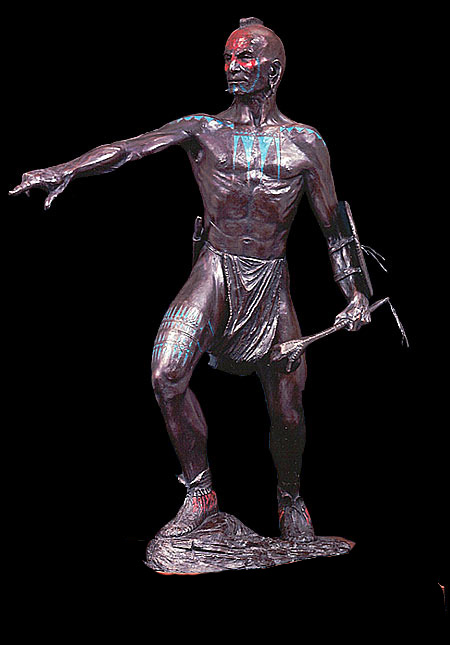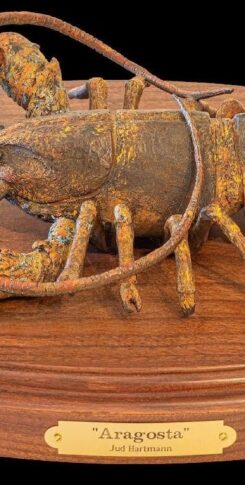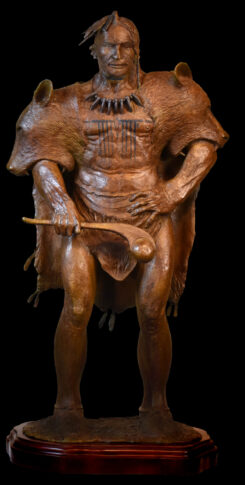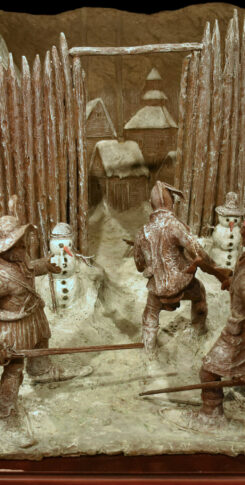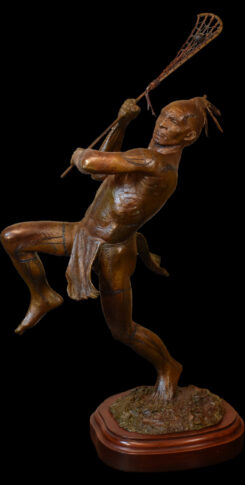Bronze edition: 20 | Height: 30″
The stern and ruthless warrior (always, at least in theory, fighting to avenge the death or insult of a blood relative or publicly avowed friend), might become a noted war-captain or an official war chief. The war-captain ideal, open as it was to all youths, irrespective of clan or lineage … was perhaps the most emulated. In the 17th century an Onondaga war-captain named Aharihon bore the reputation of being the greatest warrior of the country. He realized the ideal of autonomous responsibility to virtually pathological perfection.
Aharihon was a man of dignified appearance and imposing carriage, grave, polished in manner and self contained. His brother had been killed in the wars with the Erie about 1654. As clansman and close relative he was entitled – indeed obligated – either to avenge his brother’s death by adopting a war captive to take his brothers’ place, or by killing some Erie people. Aharihon chose the latter course. Within a few years he captured or had presented to him for adoption 40 men. Each of them he burned to death over a slow fire because, as he said, “he did not believe that there was anyone worthy to occupy his brother’s place.” Aharihon’s career of death continued without interruption so that by 1663 he was able to boast that he had killed 60 men with his own hand and had burned fully 80 men over slow fires. He dept count by tattooing a mark on his thigh for each successive victim. He was known then as captain-general of the Iroquois and was nicknamed Nero by the French because of his cruelty – the French finally captured him near Montreal but even in captivity his manner was impressive.
“My pen has no ink black enough to describe the fury of the Iroquois.”
Fr. Rageneau (1647)
“This man,” commented Fr. Lalemont, “commonly has 9 slaves with him, 5 boys and 4 girls. He is a captain of dignified appearance and imposing carriage, and of such equanimity and presence of mind that, upon seeing himself surrounded by armed men, he showed no more surprise than if he had been alone; and when asked if he would like to accompany us to Montreal, he deigned only to answer coldly that that was not a question to ask of him since he was in our power. Accordingly, he was made to come aboard our vessel, where I took pleasure in studying his disposition as well as that of an Algonkian in our company, who bore the scalp of an Iroquois but recently slain by him in war. These two men, although hostile enough to eat each other, chatted and laughed on board that vessel with great familiarity, it being very hard to decide which of the two was more skillful in masking his true feelings. I had Nero placed near me at table where he bore himself with a gravity, a self control and a propriety, which showed nothing of his barbarian origins.”
Fr. Lalemont (1663) from A.F.C. Wallace, 1968
“It is imagined in France that the Iroquois must be of a ferocious aspect and that their very sight and name would strike terror into all who would encounter them … generally speaking you would nowhere find finer looking men. The savages (the Algonquins) are of a better build than the French but even so, side by side with the Iroquois these other savages seemed dwarfed.”
Fr. Bonin (1735)
“One of the ancients has well said that fortune is ambitious, seeking only noble prey and that her designs are much oftener against stately edifices than against rustic cabins … Perhaps we were so humbled last year and reduced to so low a state as not to be hit by the thunderbolts of the Iroquois who have turned their arms elsewhere and are haughty enough to disdain conquests (that are beneath them.)”
Fr. Jerome Lalemont (1661)
“Our young men will no more fight the French; but they are too war-like to stay at home and this summer we shall invade the country of the Eries. Here all will remain calm but in that quarter the earth will tremble and the ground will quake.”
An Onondaga orator on a visit to Montreal (1653)
The destroyers (the Iroquois of 1650-1670) “gained a bloody supremacy. They carried all before them because there were animated throughout as one man, by the same audacious pride and insatiable rage for conquest.”
Francis Parkman, 1867
“In a word, they ate men with as much appetite and more pleasure than hunters eat a boar or stag.”
Fr. Vimont, 1653
“My pen has no ink black enough to describe the fury of the Iroquois.”
Fr. Rageneau (1647)

